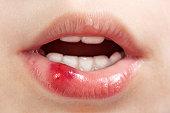Treatment
Initially, the person should be checked for associated injuries such as problems breathing or swallowing, facial fractures, loose or missing teeth, and/or more serious tissue loss. Patients should receive a tetanus vaccine if their tetanus shot is not up-to-date. Serious facial wounds should be treated at a trauma center by a surgeon.
Very often, treatments include observation for many wounds (usually under about 1 cm in length and less than about ¾ cm in-depth) and do not involve the vermilion border (the cosmetic line that marks the border of the lips on the face). However, lacerations that bleed for more than 15 minutes after holding pressure may require stitches. Tissue flaps, cuts through the vermilion border, and deep lacerations that involve the musculature usually require stitches as do those lacerations that penetrate all away through the skin, and those with jagged, irregular edges and deeper than about 3/4 centimeter in depth. In addition, the skin at the right and left corners of the mouth may have a tendency to bleed freely and also may require a stitch to prevent bleeding and further damage.
Injuries to the mouth often result in a lot of bleeding because there are a lot of blood vessels in the soft tissues of the mouth. Consequently, even a small laceration of the lips, mucosa, gingiva (gums), and/or tongue may bleed freely for short period of time. Most lacerations and/or puncture wounds of the mouth stop bleeding before the person arrives in the emergency department.
Overview
- Many mouth wounds do not require any medical treatment. Some may need a tetanus booster and stitches.
- Most mouth wounds are caused by trauma, either by blunt trauma, a sharp object, and/or the individual’s own teeth.
- Mouth wound symptoms include:
- bleeding,
- lacerations,
- tissue flaps,
- puncture wounds, and/or
- cuts across the lips’ vermilion border (the cosmetic line that marks the border of the lips on the face).
- Treatments range from conservative care (wound cleaning and bandaging), to stitching, antibiotics, and conscious sedation. Treatment of severe mouth wounds should be done emergently at a trauma center in consultation with a surgeon.
- Many mouth wounds do not require stitches. Healed mouth wounds may leave minor scarring; if there is any concern by the individual about potential scarring, a maxillofacial or plastic surgeon consultation should be consulted.
- Mouth wound prevention is difficult especially in children and in individuals that play contact sports. For those who play contact sports, helmets, facemasks, and mouth guards may help prevent some mouth wounds; avoiding risky activity (for example, boxing, skateboarding, and other similar activities or falling hazards in the elderly) also may reduce the chance of mouth wounds.
- Most mouth wounds heal without intervention in about seven days, and have an excellent outcome with no complications even when they require stitches. However, the prognosis decreases if wounds become infected or those wounds that require stitching are left untreated.
Causes for Mouth Wound
Mouth wounds are usually caused by either blunt trauma that cuts tissue, sharp objects, and/or by the persons own teeth (for example, a child or an adult hitting their mouth during a fall).
